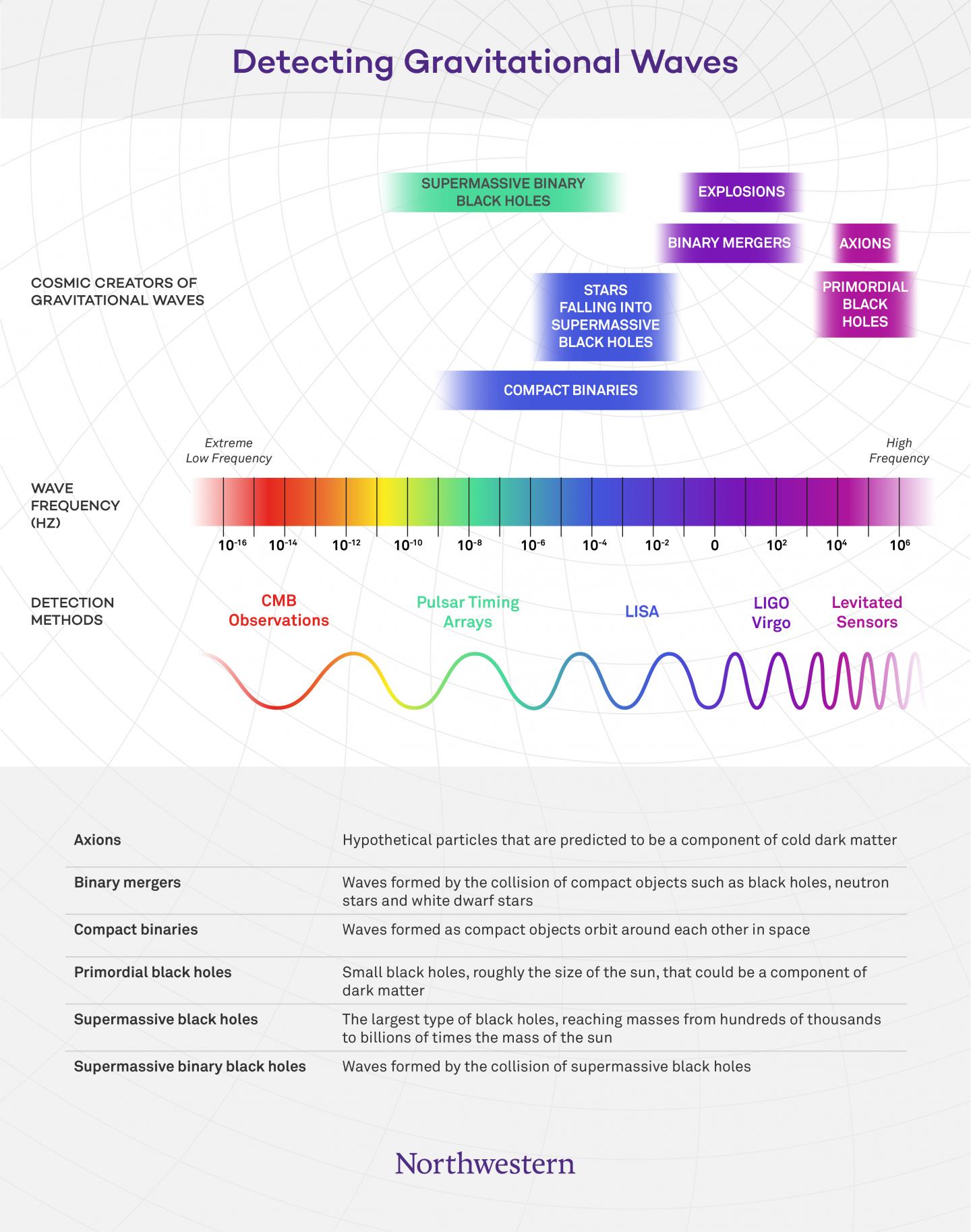Physicists and astronomers lead efforts to detect new types of cosmic events

Credit: Northwestern University
A team of physicists and astronomers from Northwestern University is poised to lead gravitational-wave astronomy into its next evolution. The W. M. Keck Foundation has awarded $1 million, which will be used to develop a prototype for a new kind of gravitational-wave detector that is small enough to fit on a tabletop and powerful enough to detect cosmic events that existing astronomical equipment cannot.
“This is the start of the next phase of gravitational-wave and multi-messenger astronomy,” said Andrew Geraci, principal investigator on the project. “This tabletop sensor will be able to observe events we’ve never seen before, expanding our understanding of space and the universe.”
Geraci is an associate professor of physics and astronomy in Northwestern’s Weinberg College of Arts and Sciences and a faculty member of the Center for Fundamental Physics (CFP) and the Center for Interdisciplinary Exploration and Research for Astrophysics (CIERA) at Northwestern.
The Levitated Sensor Detector will extend the spectrum of detectable gravitational waves to higher frequencies, possibly opening a window to the types of events that are related to the mysterious dark matter in the universe. It will complement research being conducted at the Laser Interferometer Gravitational-Wave Observatory (LIGO) and Virgo observatories, which occupy several acres of land in the United States and Italy, by observing smaller cosmic events that produce waves at a frequency LIGO and Virgo cannot detect.
“If you think of gravitational waves like sound waves, the frequency we are trying to capture with levitated sensors is sort of like a dog whistle,” said Vicky Kalogera, project co-investigator and CIERA director.
“Dogs are capable of hearing sound frequencies that the human ear cannot perceive. Similarly, levitated sensors will pick up frequencies that LIGO and Virgo cannot detect,” said Kalogera, who also is the Daniel I. Linzer Distinguished University Professor of Physics and Astronomy and one of the foremost astrophysicists in the LIGO Scientific Collaboration (LSC).
Northwestern scientists will spend two years building and testing the levitated sensor prototype, which will consist of two arms in an L-formation, each measuring about one meter in length. The levitated sensor will then operate for a one-year observing run, the results of which will be shared with the international gravitational-wave and astronomy communities.
Levitated sensors will be capable of detecting cosmic events that produce gravitational waves with a frequency of greater than 10 kHz. These events are thought to be the result of small cosmic events involving black holes similar in mass to Earth’s sun, and primordial black holes produced in the earliest days of the universe. Astrophysicists theorize but have so far been unable to prove that these events are responsible for the creation of dark matter. Other dark matter candidates such as axions, hypothetical particles that are predicted to be a component of cold dark matter, also can be searched for using the device.
Development of this tabletop detector coincides with the development of a third type of detector on the opposite end of the frequency spectrum. The European Space Agency plans to launch LISA, a space-based gravitational-wave detector that spans tens of millions of miles, in the early 2030s.
“Just like electromagnetic astronomy has telescopes and gamma-ray detectors and more, the gravitational-wave community is now developing the tools needed to detect events on all parts of the spectrum,” project co-investigator Shane Larson said. “LISA will detect the big events; LIGO and Virgo pick up the medium events; and LSD will detect the smallest cosmic events.”
###
Larson is associate director of CIERA and a research associate professor of physics and astronomy at Northwestern. He also is a member of the LISA Consortium and the LSC.
The project, titled “A novel tabletop gravitational-wave detector for frequencies > 10 kHz,” is supported by the W. M. Keck Foundation.
The grant counts toward We Will. The Campaign for Northwestern. The funds raised through the “We Will” Campaign are helping realize the transformational vision set forth in Northwestern’s strategic plan and solidifying the University’s position among the world’s leading research universities. More information on the “We Will” Campaign is available at wewill.northwestern.edu.
Based in Los Angeles, the W. M. Keck Foundation was established in 1954 by the late W. M. Keck, founder of the Superior Oil Company. The Foundation’s grant making is focused primarily on pioneering efforts in the areas of medical research and science and engineering. The Foundation also maintains a Southern California Grant Program that provides support for the Los Angeles community, with a special emphasis on children and youth. For more information, please visit http://www.
Media Contact
Kayla Stoner
[email protected]
Original Source
https:/




